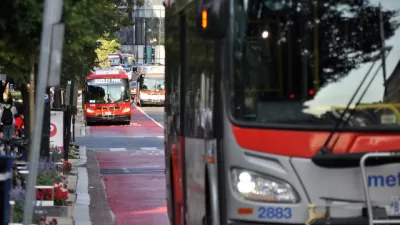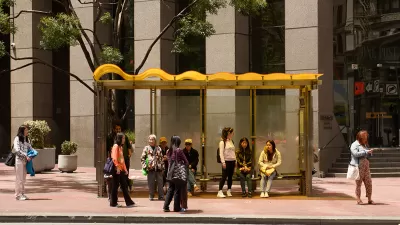A new report, "Subsidizing Traffic Congestion: The Multibillion-Dollar Tax Subsidy That’s Making Your Commute Worse," was released earlier this week by TransitCenter and Frontier Group.
According to Tanya Snyder at Streetsblog USA, the "Subsidizing Traffic Congestion: The Multibillion-Dollar Tax Subsidy That’s Making Your Commute Worse" report by TransitCenter and the Frontier Group finds that the annual parking commuter tax subsidy costs taxpayers an estimated $7.3 billion in foregone revenue. In addition, this backwards incentive adds an additional 820,000 cars to commuting rush-hour traffic each weekday, creating more congestion and lost productivity.
In January 2014, Congressional action caused the commuter transit benefit to fall to $130 each month from one's pre-tax benefits, if driving benefits are $245 per month. As Snyder writes, "[most] advocacy efforts centered on commuter tax subsidies attempt to raise the transit benefit — currently capped at $130 per month. Last week, for instance, two members of Congress pledged to fight for an equal commuter benefit for transit and parking. TransitCenter and the Frontier Group argue that this is the bare minimum to strive for. The real impact lies in simply getting rid of the parking benefit."
Indeed, "TransitCenter and Frontier Group estimate that while most people don’t change their commuting behavior based on the incentives created by these tax benefits, about 2 percent do — and that 2 percent drives 4.6 billion additional miles per year. To make matters worse, they do that extra driving at peak hours, in crowded downtown areas, worsening congestion that the country’s transportation policy is supposedly oriented toward fixing."
The report recommends eliminating the parking tax benefit, making federal support for transit more progressively equitable, and improving and expanding the current transit tax benefit.
FULL STORY: The Parking Tax Benefit: A $7.3 Billion Subsidy for Traffic Congestion

Planetizen Federal Action Tracker
A weekly monitor of how Trump’s orders and actions are impacting planners and planning in America.

Chicago’s Ghost Rails
Just beneath the surface of the modern city lie the remnants of its expansive early 20th-century streetcar system.

San Antonio and Austin are Fusing Into one Massive Megaregion
The region spanning the two central Texas cities is growing fast, posing challenges for local infrastructure and water supplies.

Since Zion's Shuttles Went Electric “The Smog is Gone”
Visitors to Zion National Park can enjoy the canyon via the nation’s first fully electric park shuttle system.

Trump Distributing DOT Safety Funds at 1/10 Rate of Biden
Funds for Safe Streets and other transportation safety and equity programs are being held up by administrative reviews and conflicts with the Trump administration’s priorities.

German Cities Subsidize Taxis for Women Amid Wave of Violence
Free or low-cost taxi rides can help women navigate cities more safely, but critics say the programs don't address the root causes of violence against women.
Urban Design for Planners 1: Software Tools
This six-course series explores essential urban design concepts using open source software and equips planners with the tools they need to participate fully in the urban design process.
Planning for Universal Design
Learn the tools for implementing Universal Design in planning regulations.
planning NEXT
Appalachian Highlands Housing Partners
Mpact (founded as Rail~Volution)
City of Camden Redevelopment Agency
City of Astoria
City of Portland
City of Laramie




























